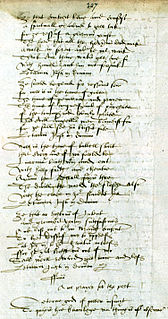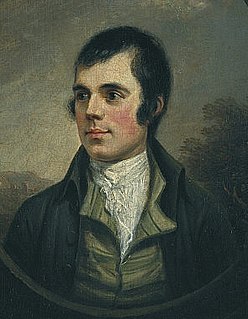
Poetry is a form of literature that uses aesthetic and often rhythmic qualities of language − such as phonaesthetics, sound symbolism, and metre − to evoke meanings in addition to, or in place of, a prosaic ostensible meaning. A poem is a literary composition, written by a poet, utilising this principle.

A loanword is a word permanently adopted from one language and incorporated into another language without translation. This is in contrast to cognates, which are words in two or more languages that are similar because they share an etymological origin, and calques, which involve translation. Loanwords from languages with different scripts are usually transliterated, but they are not translated.
Lallans, is a term that was traditionally used to refer to the Scots language as a whole. However, more recent interpretations assume it refers to the dialects of south and central Scotland, while Doric, a term once used to refer to Scots dialects in general, is now generally seen to refer to the Mid Northern Scots dialects spoken in the north-east of Scotland.
Literal and figurative language is a distinction within some fields of language analysis, in particular stylistics, rhetoric, and semantics.

William Dunbar was a Scottish makar poet active in the late fifteenth century and the early sixteenth century. He was closely associated with the court of King James IV and produced a large body of work in Scots distinguished by its great variation in themes and literary styles. He was likely a native of East Lothian, as assumed from a satirical reference in The Flyting of Dumbar and Kennedie. His surname is also spelt Dumbar.

The following are lists of words in the English language that are known as "loanwords" or "borrowings," which are derived from other languages.
The Greek language has contributed to the English vocabulary in five main ways:
Linguistic purism in English involves opposition to foreign influence in the English language. English has evolved with a great deal of borrowing from other languages, especially Old French, since the Norman conquest of England, and some of its native vocabulary and grammar have been supplanted by features of Latinate and Greek origin. Efforts to remove or consider the removal of foreign terms in English are often known as Anglish, a term coined by author and humorist Paul Jennings in 1966.
Although English is a Germanic language, it has Latin influences. Its grammar and core vocabulary are inherited from Proto-Germanic, but a significant portion of the English vocabulary comes from Romance and Latinate sources. A portion of these borrowings come directly from Latin, or through one of the Romance languages, particularly Anglo-Norman and French, but some also from Italian, Portuguese, and Spanish; or from other languages into Latin and then into English. The influence of Latin in English, therefore, is primarily lexical in nature, being confined mainly to words derived from Latin and Greek roots.
Poetic diction is the term used to refer to the linguistic style, the vocabulary, and the metaphors used in the writing of poetry. In the Western tradition, all these elements were thought of as properly different in poetry and prose up to the time of the Romantic revolution, when William Wordsworth challenged the distinction in his Romantic manifesto, the Preface to the second (1800) edition of Lyrical Ballads (1798). Wordsworth proposed that a "language near to the language of men" was as appropriate for poetry as it was for prose. This idea was very influential, though more in theory than practice: a special "poetic" vocabulary and mode of metaphor persisted in 19th century poetry. It was deplored by the Modernist poets of the 20th century, who again proposed that there is no such thing as a "prosaic" word unsuitable for poetry.

A makar is a term from Scottish literature for a poet or bard, often thought of as a royal court poet.
Classical and neoclassical compounds are compound words composed from combining forms derived from classical Latin or ancient Greek roots. New Latin comprises many such words and is a substantial component of the technical and scientific lexicon of English and other languages, including international scientific vocabulary (ISV). For example, bio- combines with -graphy to form biography.

An inkhorn term is a loanword, or a word coined from existing roots, which is deemed to be unnecessary or overly pretentious.

"I that in Heill wes and Gladnes", also known as "The Lament for the Makaris", is a poem in the form of a danse macabre by the Scottish poet William Dunbar. Every fourth line repeats the Latin refrain timor mortis conturbat me, a litanic phrase from the Office of the Dead.
Owing to its origin in ancient Greece and Rome, English rhetorical theory frequently employs Greek and Latin words as terms of art. This page explains commonly used rhetorical terms in alphabetical order. The brief definitions here are intended to serve as a quick reference rather than an in-depth discussion. For more information, click the terms.
Reborrowing is the process where a word travels from one language to another and then back to the originating language in a different form or with a different meaning. This path is indicated by A→B→A, where A is the originating language, and can take many forms. A reborrowed word is sometimes called a Rückwanderer.

The Castalian Band is a modern name given to a grouping of Scottish Jacobean poets, or makars, which is said to have flourished between the 1580s and early 1590s in the court of James VI and consciously modelled on the French example of the Pléiade. Its name is derived from the classical term Castalian Spring, a symbol for poetic inspiration. The name has often been claimed as that which the King used to refer to the group, as in lines from one of his own poems, an epitaph on his friend Alexander Montgomerie:

The Bannatyne Manuscript is an anthology of literature compiled in Scotland in the sixteenth century. It is an important source for the Scots poetry of the fifteenth and sixteenth centuries. The manuscript contains texts of the poems of the great makars, many anonymous Scots pieces and works by medieval English poets.

Scots-language literature is literature, including poetry, prose and drama, written in the Scots language in its many forms and derivatives. Middle Scots became the dominant language of Scotland in the late Middle Ages. The first surviving major text in Scots literature is John Barbour's Brus (1375). Some ballads may date back to the thirteenth century, but were not recorded until the eighteenth century. In the early fifteenth century Scots historical works included Andrew of Wyntoun's verse Orygynale Cronykil of Scotland and Blind Harry's The Wallace. Much Middle Scots literature was produced by makars, poets with links to the royal court, which included James I, who wrote the extended poem The Kingis Quair. Writers such as William Dunbar, Robert Henryson, Walter Kennedy and Gavin Douglas have been seen as creating a golden age in Scottish poetry. In the late fifteenth century, Scots prose also began to develop as a genre. The first complete surviving work is John Ireland's The Meroure of Wyssdome (1490). There were also prose translations of French books of chivalry that survive from the 1450s. The landmark work in the reign of James IV was Gavin Douglas's version of Virgil's Aeneid.

Walter Kennedy, younger brother of John Kennedy, 2nd Lord Kennedy of Dunure. Clan Kennedy. He was parson of Douglas who acquired Glentig in 1504 from John Wallace, and married Christian Hynd.










